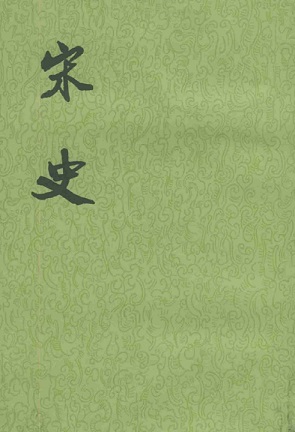“SEE here, Quentin,” said his mother, “you ought to go and call on the Marquis.”
“Very well,” Quentin answered, “must I go today?”
“You’d better.”
“Then I shall.”
“Do you remember where he lives?”
“Yes, I think I can find the house.”
“It’s in the Calle del Sol; any one will point out the palace to you.”
Quentin left the house, turned into the Plaza1 de la Corredera, and from the Calle del Poyo, by encircling a church, he came out upon the Calle de Santiago. It was a moderately warm day in January, with an overcast2 sky. A few drops of rain were falling.
Quentin was very much preoccupied3 by the visit he was about to make.
So far, he had not asked what relation he was to that man. Surely some relationship did exist; a bastard4 kinship; something defamatory to Quentin.
Sunk deep in these thoughts, Quentin wandered from his way, and was obliged to ask where the street was.
The palace of the Marquis of Tavera stood in a street in the lower part of town, which with different names[44] for its different parts, stretched from the Plaza de San Pedro to the Campo de la Madre de Dios.
The Marquis’ palace was extremely large. Five bay-windows, framed in thick moulding, with ornate iron-work and brass5 flower-pots, opened from a façade of a yellow, porous6 stone. On either side of the larger centre balcony, there rose two pilasters surmounted7 by a timpanum, in the middle of which was the half-obliterated carving8 of a shield. The decayed iron-work of the balustrade was twisted into complicated designs.
On the ground floor, four large gratings clawed the walls of the palace, and in the centre was a large opening closed by a massive door studded with nails, and topped by a fan-shaped window.
Before the palace, the street widened into a small-sized plaza. Quentin entered the wide entrance, and his footsteps resounded9 with a hollow sound.
Some distance ahead of him, through the iron bars of the grating at the end of a dark gallery, he could see a sunny garden; and that shady zone, terminating in such a brilliant spot of light, recalled the play of light and shade in the canvases of the old masters.
Quentin pulled a chain, and a bell rang in the distance with a solemn sound.
Several minutes elapsed without any one coming to the entry, and Quentin rang again.
A moment later the vivid sunlight of the distant garden, which shone like a square patch of light at the end of the shadowy corridor, was dimmed by the silhouette10 of a man who came forward until he reached and opened the grating. He was small in stature11, and old, and wore overalls12, an undershirt, and a broad-brimmed hat.
“What did you wish?” asked the old man.[45]
“Is the Señor Marqués at home?”
“Sí, Señor.”
“May I see him?”
“I don’t know; ask upstairs.” The old man opened the grating, and Quentin passed through.
Through a door on the right he could see a deserted13 patio14. In the centre of it was a fountain formed by a bowl which spilled the water into a basin in six sparkling jets. On the left of the wide vestibule rose a monumental stairway made of black and white marble. The very high ceiling was covered with huge panels which were broken and decayed.
“Is this the way?” Quentin asked the old man, pointing to the stairway.
“Sí, Señor.”
He climbed the stairs to the landing, and paused before a large, panelled, double door. In the centre of each half, he discerned two large and handsomely carved escutcheons. To the left of this door there was a window through which Quentin peeped.
“Oh, how beautiful!” he murmured in astonishment15.
He saw a splendid garden, full of orange trees laden16 with fruit. In the open, the trees were tall and erect17; against the walls they took the form of vines, climbing the high walls, and covering them with their dark green foliage18.
A light rain was falling, and it was a wonderful sight to see the oranges glistening19 like balls of red and yellow gold among the dark, rain-soaked leaves. The glistening brilliancy of the foliage, and of the golden fruit, the grey sky, and the damp air created an extraordinary effect of exuberance20 and life.
Silence reigned21 in the shady garden. From time to[46] time, from his hiding-place in a tree, some bird poured forth22 his sweet song. A pale yellow sunbeam struggled to illuminate23 the spot, and as it was reflected upon the wet leaves, it made them flash with a metallic24 brilliancy....
Above the opposite wall, rose the silhouette of a blackened and moss-covered belfry, surmounted by the figure of an angel. In the distance, over the house-tops, rose the dark sierra, partially25 hidden by bluish mists. These mists were moved about by the wind, and as they drifted along, or dissipated into the air, they disclosed several white orchards26 which heretofore had been concealed27 by the haze28.
On the mountain-top, as the white penants of mist floated among the trees, they left tenuous29 filaments30 like those silver threads woven among the thorn bushes by lemures.
Quentin was gazing tirelessly upon the scene, when he heard footsteps behind him. He turned and saw a little girl of ten or twelve years, with her hair down her back.
“Good-afternoon,” said the child with a marked Andalusian accent, as she came up to him.
Quentin removed his hat respectfully, and the child smiled.
“Have you rung?” she asked.
“No.”
She rang the bell, and a large, over-grown servant girl opened the door and asked Quentin what he wanted.
“Give the Señor Marqués my card,” he said, “and tell him that I have come to pay him my respects.”
“Come in, Señor.”
Quentin entered. He rather wished that the Marquis[47] would not care to receive him, hoping in this way to avoid making a tiresome31 call, but his wish was not granted, for in a short time, the over-grown servant girl asked him to kindly32 follow her.
They traversed a gallery whose windows looked out upon the patio of the fountain; then, after crossing two large, dark rooms, they came to a high-ceilinged hall panelled in leather, and with a red rug, tarnished33 by the years, upon the floor.
“Sit down, Señor; the master will be here directly,” said the maid.
Quentin seated himself and began to examine the hall. It was large and rectangular, with three broad, and widely-separated balcony windows looking out upon the garden. The room possessed34 an air of complete desolation. The painted walls from which the plaster had peeled off in places, were hung with life-size portraits of men in the uniforms and habiliments of nobility: in some of the pictures the canvas was torn; in others, the frames were eaten by moths35: the great, rickety, leather-covered armchairs staggered under the touch of a hand upon their backs: two ancient pieces of tapestry36 with figures in relief, which concealed the doors, were full of large rents: on the panels in the ceiling, spiders wove their white webs: a very complicated seventeenth century clock, with pendulum37 and dial of copper38, had ceased to run: the only things in that antique salon39 that were out of harmony, were the French fire-place in which some wood was burning, and a little gilt40 clock upon the marble mantel, which, like a good parvenu41, impertinently called attention to itself.
When he had waited a moment, a curtain was pulled aside, and an old man, bent42 with age, entered the salon.[48] He was followed by a little bow-legged hunchback, crosseyed, grey-haired, and dressed in black.
“Where is the boy?” asked the old man in a cracked voice.
“Right in front of you,” replied the hunchback.
“Come closer!” exclaimed the Marquis, addressing Quentin. “I do not see very well.”
Quentin approached him, and the old man seized his hand and looked at him very closely.
“Come, sit by me. Have you enjoyed good health at school?”
“Yes, Señor Marqués.”
“Don’t call me that,” murmured the old man, patting Quentin’s hand. “Have you learned to speak English?”
“Yes, sir.”
“But, well?”
“I speak it as well as I do Spanish.”
“English is very hard,” said the hunchback, who had seated himself upon the floor. “Yes means yesca (tinder); verigüel means muy bien (very well), and as for the rest—when you can say, ‘I catch, I go, I say’—you know English.”
“Hush, Colmenares,” said the Marquis, “don’t be a fool.”
“You’re more of a fool than I am,” replied the dwarf43.
The old man, paying no attention to him, said to Quentin:
“I already know, I already know that you have not been up to any more foolishness.”
The hunchback burst into noisy laughter.
“Then he doesn’t belong to your family,” he ex[49]claimed, “because every one of your family, beginning with you, is a fool.”
“Hush, buffoon44, be quiet; I’ll warm your ribs45 for you if you don’t.”
This threat from the lips of the sickly octogenarian, was absolutely absurd; but the hunchback appeared to take it in earnest, for he began to make faces and grin in silence.
“Oh, Colmenares,” said the old man, “kindly call Rafaela, will you?”
“Very well.”
The hunchback went out, leaving the Marquis and Quentin alone.
“Well, my boy, I have asked your mother about you very often. She told me that you were well, and that you were working hard. I am very glad to see you”—and again he pressed Quentin’s hand between his own weak and trembling ones.
Quentin regarded the old man tenderly, without knowing what to say. At this moment, the hunchback returned, followed by a young lady and a little girl. The little girl was the one Quentin had greeted upon the stairs; the young lady was the same girl he had seen several years before—probably in that very same room.
Quentin rose to greet them.
“Rafaela,” said the old man, addressing the older girl, “this boy is a relative of ours. I am not going to recall incidents that sadden me: the only thing I want is that you should know that you are related. Quentin will come here often, will you not?”
“Yes, sir,” answered he, more and more astounded47 at the direction the interview was taking.
“Good. That is all.[50]”
At this point, the hunchback, clutching the Marquis by the sleeve, asked:
“Would you like me to play for you?”
“Yes, do.”
The hunchback brought a small, lute-shaped guitar, drew up a tabouret, and sat at the feet of the Marquis. Then he began to pluck the strings48 with fingers as long and delicate as spiders’ legs. He played a guitar march, and then, much to Quentin’s astonishment, the old Marquis began to sing. He sang a patriotic49 song in a cracked voice. It was a very old one, and ended with the following stanza50:
Ay mi patria, patria mía,
y tambien de mi querida;
luchar valiente por patria y amor,
es el deber del guerrero español.
(Ah, my country, country of mine, and also of my sweetheart; to fight for country and love, is the duty of the Spanish warrior51.)
When the old man had finished the song, his grand-daughters embraced him, and he smiled most contentedly52.
Quentin felt as though he had been transported to another century. The shabby house, the old Marquis, the buffoon, the beautiful girls—everything seemed unusual.
The two sisters were pretty; Rafaela, the older sister, was extremely attractive. Some twenty-three or twenty-four years of age, she had clear, blue eyes—eyes the colour of pale blue satin—blond hair, a straight nose, and an enchanting53 smile. Lacking the freshness of her[51] first youth, there was a suspicion of marcidity in her face, which, perhaps, enhanced her attractiveness.
The face of Remedios, the child, was less symmetrical, but more positive: she had large, black eyes, and an expression of mixed audacity54, childishness, and arrogance55. Now and then she smiled silently and mischievously56.
When Quentin felt that he had stayed long enough, he rose, gave his hand to the two girls, and hesitantly approached the old man, who threw his arms about his neck and tearfully embraced him.
He saluted57 the hunchback with a nod of his head which was scarcely answered; descended58 the stairs, and upon reaching the vestibule, the man who had let him in, asked:
“Excuse me, Señor, but are you the man who got back from England a little while ago?”
“Yes.”
“That’s what I thought. Are you going to stay in Cordova?”
“I believe so.”
“Then we shall see you?”
“Yes, I shall call from time to time.”
The two men shook hands, and Quentin stepped into the street.
“The old man is my grandfather,” said Quentin, “that’s just what he is. His emotion, his harrowed look—that’s just what he is.”
Perhaps the best thing to do would be to ask his mother exactly what the circumstances of his birth were; but he feared to offend her.
He soon forgot about that, and began to think about[52] the blond-haired girl Rafaela. She was pretty. Indeed she was! Her clear, soft eyes; her pleasant smile; and above all, her opaque59 voice had gone straight to Quentin’s heart: but as Quentin was not a dreamer, but a Bœotian, a Horatian, as he himself had remarked, he associated with Rafaela’s soft, blue eyes, the ancestral home, the beautiful garden, and the wealth which her family must still possess.
Quentin devoted60 the days following this visit to cogitating61 upon this point.
Rafaela was an admirable prize—pretty, pleasant, and aristocratic. He must attempt the conquest. True, he was an illegitimate child. He had a desire to laugh at that thought, it seemed so operatic to him: now he could sing the aria46 from Il Trovatore:
Deserto sulla terra.
Bastard or no bastard, he considered that the thing was possible. He was tall, handsome, and above all, strong. In Eton, he had noticed that after all, the greatest attraction in a man for women is strength.
They said that the Marquis’ house was going to ruin: he would save it from ruin and restore it splendidly. Then—into the street with those who got in his way! It was a great plan.
Truly, Rafaela was an admirable prize. To marry her, and live in that sumptuous62 house with the two sisters until the place was completely repaired, would be a life indeed! He would write his school friends and tell them about his marriage to an Andalusian descendant of the Cid, and describe the patios63 filled with orange trees.... Then he could say with his poet: “Let them serve us quickly this bottle of Fa[53]lernus in the neighbouring gorge64.” After that ... then came new chapters, as yet scarcely outlined in his imagination....
He would represent himself from the very first as a romanticist, an idealist, a scorner of the impurities65 of reality. He would manifest a respectful enthusiasm for her, like that of a man who dares not even dream of so much felicity.
“You’ll win, Quentin, you’ll win,” he said to himself joyously66. “What do you desire? To live well, to have a beautiful home, not to work. Is that a crime, forsooth? And if it were a crime, then what? They do not carry one off to jail for that. No. You are a good Bœotian, a good swine in the herd67 of Epicurus. You were not born for the base bodily wants of a merchant. Dissemble a little, my son, dissemble a little. Why not? Fortunately for you, you are a great faker.[54]”





